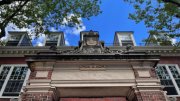The three of them around a table would make quite a dinner party: a molecular biologist studying the link between brain circuits and behavior, an immunologist harnessing research on T cells to find new therapies for cancer and autoimmune diseases, and a sociologist analyzing how crime, punishment, and inequality alter the course of people’s lives.
All three—molecular biologist Catherine Dulac, immunologist Arlene Sharpe, and sociologist Robert J. Sampson—have been named University Professors, Harvard’s highest distinction for faculty members. These appointments are effective January 1, 2023.
“I appreciate the rare gift of appointing three University Professors at the same moment—and I am thrilled by the prospect of a world improved by their good efforts,” President Larry Bacow said in a news announcement. “Catherine is changing our perceptions of who we are and what governs the things we do; Rob is untangling the threads of circumstance that run through and between our lives; Arlene is making fundamental contributions to understanding disease that lead to new therapies for preserving human health.”
Catherine Dulac, the Higgins professor of molecular and cellular biology and the Lee and Ezpeleta professor of arts and sciences, has been appointed the Samuel W. Morris University Professor. She’s a leading molecular biologist and geneticist, whose work uncovers the neural circuits behind social behaviors, particularly sex and parenting. Her lab’s earlier work found that mouse brains have circuits that determine whether the animals adopt stereotypical male or female behavior. She’s also shown that, in mice, the neuronal circuits responsible for parenting and nurturing are present and active in both sexes—suggesting that there less of a “male” and “female” gender divide in parenting instincts than often presumed. Recently, she’s turned her attention toward illness, identifying the specific neural circuits that coordinate sickness symptoms like loss of appetite and fever. She assumes the chair held by the late Dale Jorgenson, an economist.
Arlene Sharpe, currently the Fabyan professor of comparative pathology and chair of the Medical School’s department of immunology, has been appointed the Kolokotrones University Professor, succeeding the late Paul Farmer, founder of Partners In Health. Sharpe’s research focuses on T cells—a type of white blood cell that defends against pathogens and tumors—and how activating T cell responses can provide therapeutic strategies for cancer and other diseases. She has done much of the basic research on “checkpoint blockade therapy,” a strategy that helps the immune system identify and destroy cancer cells, and her work defining the PD-1 pathway has led to the PD-1 and PD-L1 blockage strategy revolutionizing cancer treatment.
Robert J. Sampson has been appointed the Woodford L. and Ann A. Flowers University Professor, succeeding George Whitesides, who is now a research professor. Sampson is currently the Henry Ford II professor of the social sciences in the Faculty of Arts and Sciences. His work as a sociologist focuses how external factors—such as poverty and the neighborhood one is born in—influence one’s life trajectory, as well as how the presence of lead and other toxins in a neighborhood affects social mobility, health, and crime over the course of one’s life. He has written several award-winning books, the latest of which, Great American City: Chicago and the Enduring Neighborhood Effect, uses data from the Project on Human Development in Chicago Neighborhoods to discuss how inequality among urban neighborhoods may have been exacerbated by globalization. Now, he’s conducting a longitudinal follow-up study spanning 25 years in the lives of participants in several birth cohorts.
Read the University announcement here.









